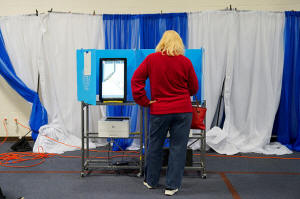US Republicans target noncitizen voting, as Trump keeps up false voter
fraud claims
 Send a link to a friend
Send a link to a friend
 [May 09, 2024]
By David Morgan and Nathan Layne [May 09, 2024]
By David Morgan and Nathan Layne
WASHINGTON (Reuters) - U.S. House Republicans on Wednesday unveiled a
bill to ban noncitizens from voting in federal elections, which is
already illegal and rarely occurs, an effort meant to draw more
attention to Donald Trump's false claims that U.S. elections are marred
by widespread fraud.
House Speaker Mike Johnson, who has relied on the former president's
support to hold off a bid to oust him from leadership by Republican
hardliner Marjorie Taylor Greene, said the measure was aimed at
preventing noncitizens from voting in November.
"We all know - intuitively - that a lot of illegals are voting in
federal elections. But it's not been something that is easily provable,"
Johnson told reporters without offering evidence to support the claim.
Republicans say the legislation would provide a needed mechanism to
safeguard voting by requiring states to collect proof of U.S.
citizenship before registering voters and to purge their voter rolls of
noncitizens.
But independent studies show noncitizen voting to be a rarity.

A study by Brennan Center for Justice at New York University looked at
42 jurisdictions, accounting for 23.5 million votes in the 2016
presidential election, and found only 30 incidents of possible
noncitizen voting, or 0.0001% of votes cast.
The legislation is likely to be dead on arrival in the Democratic-led
Senate.
Democrats have already called the bill "redundant" and a "stunt" aimed
at sowing "confusion and distrust" ahead of the Nov. 5 election rematch
between Republican Trump and Democratic President Joe Biden.
With control of the White House, Senate and House up for grabs and Trump
making illegal crossings at the U.S.-Mexico border a centerpiece of his
campaign, Republicans hope to use the legislation to tie illegal
immigration to the issue of election integrity.
"This, like many other agitations about election security and integrity,
proceeds from Trump's need to keep up the illusion that he somehow won,
and was wrongfully deprived of, the election four years ago," said
Walter Olson, a senior fellow at the right-leaning Cato Institute, a
Washington-based think tank.
Johnson first announced his plans for such a bill last month at a joint
press conference with Trump.
[to top of second column]
|

A voter casts their ballot during the midterm runoff elections at
Canaan Baptist Church in Columbus, Georgia, U.S., December 6, 2022.
REUTERS/Cheney Orr/ File Photo

'WATCH LIKE HAWKS'
Trump, whose false claims of massive voter fraud in 2020 led to the
Jan. 6, 2021, attack on the U.S. Capitol, raised the specter of
immigrant-related voting fraud earlier this year. He also said he
may not accept November election results in an interview published
last week.
"We're going to protect the vote," Trump said at a recent rally in
Freeland, Michigan. "All these Democrats we're gonna watch like
hawks... They cheat like hell. They cheat like hell."
Trump campaign spokesperson Karoline Leavitt said the former
Republican president "100% supports taking legislative action to
stop noncitizens from voting in our elections."
Much of the Republican rhetoric about noncitizen voting has focused
on efforts by municipalities including New York City, Washington,
D.C., and Montpellier, Vermont, to allow noncitizens to vote in
local elections, claiming that Democrats are increasingly pushing
for noncitizen voting.
The Republican National Committee, co-chaired by Trump
daughter-in-law Lara Trump, has engaged in 84 election-related
lawsuits in 25 states. About a dozen involve efforts by local
municipalities to allow noncitizens to vote in local elections.
The bill would also empower citizens to bring civil suits against
election officials that fail to uphold proof of citizenship
requirements and add penalties for election officials that register
noncitizens to vote in federal elections.
(Reporting by David Morgan in Washington and Nathan Layne in
Connecticut; Editing by Scott Malone and Deepa Babington)
[© 2024 Thomson Reuters. All rights reserved.]This material
may not be published, broadcast, rewritten or redistributed.
Thompson Reuters is solely responsible for this content.
 |